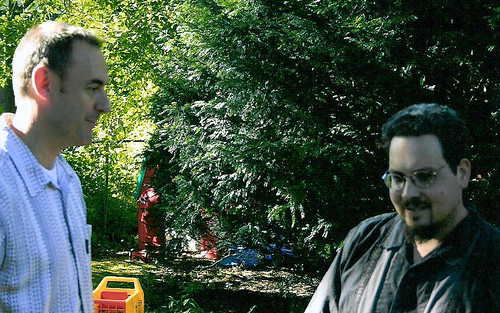|
|
Monday, February 9th, 2004
After the New Economy: This morning I started reading the chapter on Finance, which is so far equally engaging and thought-provoking, as the previous chapter. I am finding the second half of this book far stronger than the first half.
posted morning of February 9th, 2004: Respond
➳ More posts about After the New Economy
|  |
Friday, February 6th, 2004
An idea I'm slowly working on vis-a-vis After the New Economy is along these lines: The arguments Henwood makes in favor of globalization seem quite similar to those made by conservative commentators at Crooked Timber, Semi-daily Journal, and Calpundit -- the three sites where I most consistently encounter conservative pro-globalization commentators. (This is a generalization and I need to go back and figure out what arguments I am talking about, and confirm that they are really employed by the commentators in question.) Why is it that they seem so much more trustworthy to me in this book? Part of it is obviously a question of authority -- Doug Henwood has more of it on this question than people I know only from the Blogosphere -- but the idea I'm working on is that when conservatives put forward rational arguments in favor of globalization, it has the sound to my ears of a siren's song. When Henwood praises globalization, he is simultaneously pointing up the many failings of our modern economy and presenting our current situation as a stage in evolution. My fear with conservatives is that the end point of their argument is "Everything is for the best in this best of all possible worlds" -- that change and progress toward equality are to be viewed with suspicion. This idea needs more development, it does not really hold water as presented here.
posted evening of February 6th, 2004: Respond
➳ More posts about Douglas Henwood
|  |
Wednesday, February 4th, 2004
After the New Economy: I've gotten to the chapter on Globalization -- the information in this chapter is much more what I was expecting and hoping for from the book. He is not taking a position strongly in favor of or opposed to globalization, but instead is examining closely what the word actually means (or is used to mean) and how it ties in with historical capitalism, and how it plays out in the current economic scene. Plenty of stuff there to get me thinking!
posted evening of February 4th, 2004: Respond
➳ More posts about Readings
|  |
After the New Economy: I'm a bit bewildered by Henwood's assertion on p. 115 that Cox and Alm do not use relative measures in their study of income mobility. How can a ranking by quintiles be anything besides relative? -- I just don't see how such a ranking can have any absolute sense.
posted morning of February 4th, 2004: Respond
|  |
Tuesday, February third, 2004
Don Quixote: I'm a little mystified as to why Señor Quexana's niece and friends would have thought the proper way to cure his mania, would be to tell him an evil wizard had destroyed his library. Surely they could find a less paranoia-inducing story to tell? Different times, different mores, maybe...
posted morning of February third, 2004: Respond
➳ More posts about Don Quixote
|  |
Monday, February second, 2004
After the New Economy: I'm having a little trouble with chapter 3, "Income", trouble of the same variety that I recall having had while reading Wall Street -- the statistics fly fast and heavy, and at the end of a paragraph I can't really tell how much of that paragraph remains in my mind. This chapter seems to be concerned primarily with documenting the disadvantages faced by women and non-whites in finding proper recompense for their labors -- which does not seem to me totally germane to the rest of the book. The statistical information is good and useful, and I think much of it is not available elsewhere; but it seems like a detour. The piece of it that does relate to the topic of the book, is approximately that incomes did not increase during the 90's enough to make life easier for employees -- but this point is surrounded by so much other stuff that I am not sure just where he made the point, or what the point, precisely stated, is, or which statistics back it up.
posted evening of February second, 2004: Respond
|  |
Sunday, February first, 2004
Here is another candlestick, that I turned last weekend -- the walnut that caused me a lot of respiratory distress:

posted morning of February first, 2004: Respond
➳ More posts about Woodturning
|  |
Saturday, January 31st, 2004
I had coffee (rather than beer) today with Roy Edroso of Alicublog (which is to my surprise pronounced "Ali-COO-blog", not "A-LICK-yooblog"), and old friend Nathaniel Heidenheimer. Roy brought to my attention the scene on p. 22 of Don Quixote -- a scene which I had smiled at when I read it a few nights previously but without realizing how excellent it is, and how exactly descriptive of my own actions in many situations throughout my life. ...he saw that it had a great defect, which was that instead of a full sallet helmet with an attached neckguard, there was only a simple headpiece; but he compensated for this with his industry, and out of pasteboard he fashioned a kind of half-helmet that, when attached to the headpiece, took on the appearance of a full sallet. It is true that in order to test if it was strong and could withstand a blow, he took out his sword and struck it twice, and with the first blow he undid in a moment what it had taken him a week to create; he could not help being disappointed at the ease with which he had hacked it to pieces, and to protect against that danger, he made another one, placing strips of iron on the inside so that he was satisfied with its strength; and not wanting to put it to the test again, he designated and accepted it as an extremely fine sallet. I have done precisely this many times: test something which I have put a lot of effort into, find it extremely wanting, rebuild it with a little reinforcement and then skip the test -- and say to myself, the extra reinforcement is sure to make it hold. It was good to see Nathaniel again -- he says he wants to get a blog, which would be a good thing to have happen though I am a little skeptical. He made me reconsider my support for Edwards, who he thinks is totally insincere in his economically progressive talking points.
posted evening of January 31st, 2004: Respond
➳ More posts about Miguel de Cervantes
|  |
Friday, January 30th, 2004
Don Quixote: I read (last night) the prologue and introductory verse (which I more skimmed than read), and the first chapter; tonight I reread the end of the first chapter, and read the second and third chapters. It is flowing very nicely for me and giving me some laughs. The author's voice (as realized by the translator) is very strong and consistent.
posted evening of January 30th, 2004: Respond
|  |
Reading After the New Economy, my first reaction is that it's far less dry and uninteresting than I found Wall Street (counter to expectations) to be. I reckon this is probably indicative of a change in my abilities to comprehend rather than in Henwood's writing style, so I should probably go back to Wall Street sometime. Of course, another distinction between the two books is that After the New Economy has more direct personal relevance to my situation. Update: I seem to have taken to singing, in a Jim Morrison whine/moan, "After the new econ'my, turn out the lights..." -- Alas! When phrases get stuck in my head they can hang around for weeks, sucking up resources which could otherwise be better used...
posted afternoon of January 30th, 2004: Respond
| Previous posts
Archives  | |
|
Drop me a line! or, sign my Guestbook.
•
Check out Ellen's writing at Patch.com.
| |

